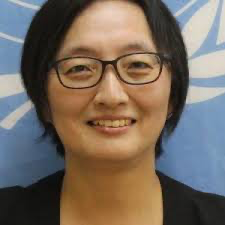
Mikiko Tanaka
October 24 ,2020
Parliament would not be viable if no-confidence motions and judicial actions become political instruments’
In a major statement on the political situation here, United Nations (UN) Resident Co-ordinator Mikiko Tanaka today said that given the slim margin in the legislature between the two sides, parliamentary decision-making should entail consensus building and compromise so as to be inclusive of all sides.
In an Op-Ed published in today’s Stabroek News on the occasion of the 75th anniversary of the UN, Tanaka said that parliamentary oversight should go beyond simply opposing and defending and “genuinely serve to improve accountability and performance of the public sector”.
Tanaka stated that Guyana has the opportunity to reshape the economy, society and governance towards the UN’s flagship Sustainable Development Goals (SDGs) but that a genuine transformation requires “addressing some difficult legacy issues that are structural and systemic in nature and challenges some entrenched norms and values”.
In what will be a sign that the UN will take an active interest in governance reforms here, Tanaka said that legacy issues would take the “full participation and collaboration of government and state institutions, private sector, civil society and citizens to make this transformation”.
Tanaka said that the last two years have unveiled fundamental issues about citizen participation and representation.
“Protecting the integrity of elections and ballots is critical, but the ability of citizens to participate in public policies and decision-making in between elections is also important. Parliament is the supreme institution of citizen representation. When the margin between the government and the opposition is one or two seats, parliamentary decision-making should entail consensus-building and compromise to be inclusive of all Guyanese citizens”, Tanaka asserted.
In what will be seen as a reference to the political instability in recent years, Tanaka said “Parliament would not be viable if no-confidence motions and judicial actions become political instruments”.
Tanaka added that regional and local governments can bring decision-making closer to citizens “if meaningfully decentralized with accompanying resources, authority and tools”
She said that the potential for citizen participation and community development is extensive if enabled.
According to Tanaka, education, health care, social protection and policing are essential services that need “uphaul in standards, quality and accessibility”. She stated that the COVID-19 pandemic has shone a light on the tireless and often thankless work of health workers, teachers, social workers and police.
Noting that recognizing good work is as important as addressing substandard performance, Tanaka also raised the goal of meritocracy.
“Instilling meritocracy in the public sector requires system-wide consistency and integrity encompassing recruitments, training, management, promotions”, she noted.
Turning to the issue of employment, Tanaka said that doing business in Guyana was challenging but “extremely difficult” for those without assets, connections, skills, identification documents and access.
“The same applies to getting jobs in the public sector, and jobs in the formal private sector are scarce in number. Over half the labour force is informal and 12% were unemployed before COVID-19”, she said.
Tanaka added that an inclusive economic transformation requires professionalism, competition meritocracy and equality standards. She also floated the issue of affirmative action.
“It calls for tailored and affirmative actions to equalize the playing field for all individuals and to stop sexual harassment, power abuse and discriminatory practices and conditions”, Tanaka contended.
She added that citizens can demand and help create these conditions.
Noting that Guyana has not been spared by the pandemic and its broad socio-economic impact, Tanaka said that the five-month electoral crisis had “compounded hardships and social divisions and shattered citizen confidence in political and institutional systems”.
She added that the new government had acted swiftly in introducing tax and policy measures to boost economic activity and provide much-needed emergency aid.
Tanaka contended that civil society and the media, including social media, are essential channels for citizens to shape the culture and values that underpin how institutions and society operate but warned that hate speech and violence close down space for constructive civil society and citizen voices.
The Resident Co-ordinator hailed the media for their work during the electoral crisis.
“A big thanks goes to the journalists and media outlets who displayed courage, reason and integrity through the electoral crisis”, she said.
Tanaka added that in UN75 conversations in Guyana young people wanted to contribute to national development and be part of shaping a just future with “equal access to services, opportunities and jobs and where people respect and understand each other in dialogue”.
Earlier in her message, Tanaka said that the 17 SDGs encompass people, prosperity, the planet and peace and are universal to all.
“COVID-19 has plunged us backward by decades and has exposed divisions, disparities and weaknesses of economies, societies and politics”, she added.
